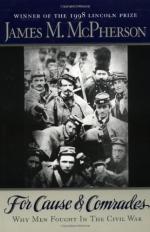
|
| Name: _________________________ | Period: ___________________ |
This quiz consists of 5 multiple choice and 5 short answer questions through Chapter 7, On the Altar of My Country.
Multiple Choice Questions
1. In the discussion of the physiological effects of warfare, a chemical reaction in the adrenal gland causes which of the following to be released?
(a) Glucose.
(b) Cortisol.
(c) Norepinephrine.
(d) Red blood cells.
2. As the excitement for battle raced across the country, the governor of Ohio said he could not send the requested thirteen regiments but would send how many?
(a) 8.
(b) 16.
(c) 20.
(d) 5.
3. In the spring of 1862, soldiers from which state felt a redoubled commitment to the war effort when large portions of their home state fell to the "insolent invader"?
(a) Tennessee.
(b) Georgia.
(c) Mississippi.
(d) Maryland.
4. After the battle of Fredericksburg, the 10th New York had fought six battles in as many months and had lost all but how many men?
(a) 68.
(b) 240.
(c) 320.
(d) 130.
5. In the explanation of the Rebel Yell, McPherson quotes a soldier from which state who had said he would never yell during battle, but had anyway?
(a) Rhode Island.
(b) Virginia.
(c) Mississippi.
(d) Georgia.
Short Answer Questions
1. During the battle of Fredericksburg, from which state was the corporal who wrote his diary that he was sick, and if not for being thought a sneak, he wouldn't be in the ranks that day?
2. When talking about the relationships between enlisted men and their officers, McPherson notes a major from which state who visited his sick and wounded soldiers every day?
3. At the end of "Chapter 7: On the Altar of My Country," McPherson says what percentage of the soldiers that comprised his sample material lost their lives in action?
4. As McPherson begins to describe the training regimen kept by soldiers, he quotes a young man from Indiana who wrote what relative, complaining a soldier "is not his own man"?
5. After the discussion of "short-timers" psychology, the author notes the pride and honor of a soldier were bound up with the pride and honor of all BUT WHICH of these?
|
This section contains 312 words (approx. 2 pages at 300 words per page) |

|




